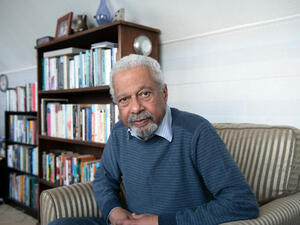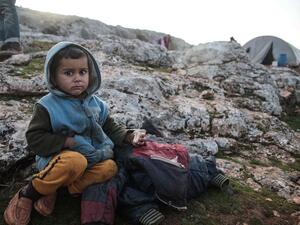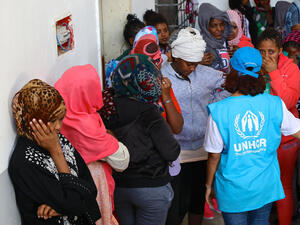UNHCR welcomes EU asylum directive, urges highest standards
UNHCR welcomes EU asylum directive, urges highest standards

Asylum seekers from various countries gather near the northern French port of Calais. EU countries are about to implement minimum standards for granting refugee status.
GENEVA, October 9 (UNHCR) - As EU-wide minimum standards for granting refugee status take effect, the UN refugee agency urged member states Monday to live up to their legal and moral obligation to protect refugees and asylum seekers by maintaining the highest possible asylum standards.
By Tuesday, European Union (EU) countries are required to have implemented the so-called "Qualification Directive," which sets out minimum standards for qualification for refugee status or other forms of international protection in the EU.
"This directive is meant to be the cornerstone of the emerging common European asylum system," said Pirkko Kourula, director of UNHCR's Europe Bureau. "It seeks to establish a uniform understanding of who is entitled to protection. This is very much needed, for although every asylum application must be examined on its merits, the chance of finding protection in the EU ranges from zero to over 80 percent for certain nationalities, depending on where they apply."
An important aspect of the directive is its recognition that the 1951 UN Refugee Convention, as currently interpreted, may not cover all those in need of protection. The Qualification Directive codifies a uniform status, which it terms "subsidiary protection," for people who do not fall under the 1951 Convention's refugee definition but nonetheless face "serious harm" in their countries of origin - death, torture or life-threatening situations such as indiscriminate violence in armed conflict situations.
Among other important provisions, the Qualification Directive confirms that acts of a gender-specific nature can constitute persecution. Gender-related persecution has increasingly been recognised as falling within the scope of the 1951 Refugee Convention's definition. Furthermore, the directive clarifies that people may need protection regardless of whether they face persecution by states, warlords, militias or other private actors, and thus puts an end to a decade-long controversy in Europe.
Some of the Qualification Directive's provisions have been criticised by UNHCR for not going far enough. "The definition of subsidiary protection in the directive is quite restrictive and it remains to be seen how many people who are in need of it will be offered this status in practice," said Kourula. "Nevertheless, it is a first step towards a harmonised system in Europe and could offer security to many who have fled civil wars, ethnic cleansing and other human rights violations."
"The Qualification Directive is not a perfect instrument," added Kourula. "It only sets minimum standards which EU member states are free to surpass. We encourage them to offer the highest standards of refugee protection."
The Qualification Directive is but one element of a common European asylum policy, the prerequisite of which is that refugees are able to access European territory and the asylum procedure. Tight border control measures make this increasingly difficult. Another important element of the common system is the establishment of asylum procedures which identify protection needs quickly and correctly.
"Europe should be proud of its tradition of giving asylum to those fleeing persecution and human rights violations. Living up to our legal and moral obligations to refugees and asylum seekers is one way of fulfilling our responsibility to protect," said Kourula.









